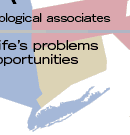






NEPA Voices represents the philosophy and orientation of the writer.
The contributions do not represent the NEPA members as a whole.
The contributions do not represent the NEPA members as a whole.
heal: the grief channel
Here are some insights learned in my years of working with loss and grief. I hope they will be helpful.
— Dr. Anne Kane
Factors Affecting Grief
There are many factors which affect how a person experiences his or her grief. Your history of loss is a major factor—if you have had many prior losses in your life, it may be harder and take more time to mourn this current loss. Did you mourn your previous losses? If not, these prior ungrieved losses may make the current loss feel unbearable. Each new grief rips the scab off prior losses.
Your state of being when the loss occurred also affects you. Were you sick, exhausted, burned out or depressed before the loss? If so, this may make the loss much more complicated to grieve. Grief takes energy! Were you involved in drug or alcohol abuse at the time of the loss? If so, that will interfere with the process.
Culture, gender, learned personality styles, and past history all affect how a person grieves. For example, if you believe that it is a weakness to cry or show emotion, your expression of grief will be severely inhibited.
Do you have a good support system? Having little or no social support makes healing very difficult.
How the person died will affect you---was it expected? Sudden? Violent? Some deaths leave you traumatized, while others may bring relief.
Finally, and most important, what was the nature of the relationship that was lost? Was it your child or a colleague at work? How you felt about the person, who they were for you, and how often you saw them all affect how you experience the loss.
Your state of being when the loss occurred also affects you. Were you sick, exhausted, burned out or depressed before the loss? If so, this may make the loss much more complicated to grieve. Grief takes energy! Were you involved in drug or alcohol abuse at the time of the loss? If so, that will interfere with the process.
Culture, gender, learned personality styles, and past history all affect how a person grieves. For example, if you believe that it is a weakness to cry or show emotion, your expression of grief will be severely inhibited.
Do you have a good support system? Having little or no social support makes healing very difficult.
How the person died will affect you---was it expected? Sudden? Violent? Some deaths leave you traumatized, while others may bring relief.
Finally, and most important, what was the nature of the relationship that was lost? Was it your child or a colleague at work? How you felt about the person, who they were for you, and how often you saw them all affect how you experience the loss.
Nourishment for the Spirit
When loss occurs, many people feel angry with God, and lose the comfort of prayer or a deep, spiritual connection. Often, grievers experience a "dark night of the soul" where they feel alone, arid, disconnected.
A spiritual practice such as mindfulness, centering prayer, or guided imagery can soothe and support the grieving spirit. Spending time in nature can remind us that we are part of something larger than ourselves, and can reconnect us to the sacred.
During our grief work, we may feel stuck in anger and resentment towards the person who died. Or, we may feel stuck in our own guilt for real or imagined transgressions. In either case, it is extraordinarily helpful to work on forgiveness. Forgiveness is something we do for ourselves, not the other person, for it releases us from our prison of anger and resentment. It also allows us to leave the past behind, and frees us to live in the precious present. Writing a letter to the person who died, stating our forgiveness or asking for theirs, can be a very powerful and effective exercise.
A beautiful and soothing balm for the spirit is the Buddhist metta meditation. The meditation is a simple exercise which cultivates compassion and love. The practice traditionally begins by allowing oneself to experience feelings of love and compassion for one's self, repeating the phrases "May I be happy, may I be healthy, may I be safe". If you wish, you can repeat the phrases (and feelings) for the person who died.
A spiritual practice such as mindfulness, centering prayer, or guided imagery can soothe and support the grieving spirit. Spending time in nature can remind us that we are part of something larger than ourselves, and can reconnect us to the sacred.
During our grief work, we may feel stuck in anger and resentment towards the person who died. Or, we may feel stuck in our own guilt for real or imagined transgressions. In either case, it is extraordinarily helpful to work on forgiveness. Forgiveness is something we do for ourselves, not the other person, for it releases us from our prison of anger and resentment. It also allows us to leave the past behind, and frees us to live in the precious present. Writing a letter to the person who died, stating our forgiveness or asking for theirs, can be a very powerful and effective exercise.
A beautiful and soothing balm for the spirit is the Buddhist metta meditation. The meditation is a simple exercise which cultivates compassion and love. The practice traditionally begins by allowing oneself to experience feelings of love and compassion for one's self, repeating the phrases "May I be happy, may I be healthy, may I be safe". If you wish, you can repeat the phrases (and feelings) for the person who died.
Tasks of Grief
We concur with psychologist Robert Neimeyer, (a prominent grief researcher from the University of Memphis, Tennessee), who has conceptualized 5 major tasks of grieving:
His primary belief is that the central process of grieving is the reconstruction of meaning in response to the loss.
Acknowledging the reality of the loss is a process that takes time…often more time than people imagine. While most of us grasp the cognitive concept of the loss in a relatively brief period of time, it can take up to a year (or more, depending upon the loss), to fully acknowledge the loss emotionally.
Many people are afraid to open themselves up to the pain…they feel it would mean they are "weak", fear being overwhelmed, or just feel too vulnerable. Some people push the pain down, with food, drugs or alcohol, or staying busy. It is just that process, however, of allowing the pain to go through us, that helps us heal. Proust said " We are healed of a suffering only by experiencing it to the full." Kahil Gibran noted that "suffering carves grooves in our hearts which later enable us to hold more joy." Even though it may not feel like it when you are in it, the pain does soften and abate.
Revising your assumptive world means allowing this experience to help you see the lens of perception through which you have viewed the world. Losing a loved one initiates us into the reality that all relationships end, suffering is part of life, none of us are immune from pain, etc. This grief experience can usher in a sadder but wiser grasp of reality, and help us let go of naïve and idiosyncratic notions.
Reconstructing your relationship with that which has been lost is, in some ways, the meat of the grief experience. It entails examining the relationship, exploring what it was for us….what meaning did it have in our lives? What did the relationship teach us…about life, about ourselves? Processing grief means moving the relationship from outside us to inside us..where it continues to live and be explored. In coming to grips with what the relationship was for us, we often find it necessary to offer forgiveness, ask for forgiveness, or both.
Finally, reinventing ourselves means recommitting to being fully alive again, investing in ourselves and in our own lives. It means incorporating the insights gained into our lives, experiencing a sense of growth, transformation and transcendence.
- 1. Acknowledge the reality of the loss.
- 2. Open yourself to the pain.
- 3. Revise your assumptive world.
- 4. Reconstruct your relationship to that which has been lost.
- 5. Reinvent yourself.
His primary belief is that the central process of grieving is the reconstruction of meaning in response to the loss.
Acknowledging the reality of the loss is a process that takes time…often more time than people imagine. While most of us grasp the cognitive concept of the loss in a relatively brief period of time, it can take up to a year (or more, depending upon the loss), to fully acknowledge the loss emotionally.
Many people are afraid to open themselves up to the pain…they feel it would mean they are "weak", fear being overwhelmed, or just feel too vulnerable. Some people push the pain down, with food, drugs or alcohol, or staying busy. It is just that process, however, of allowing the pain to go through us, that helps us heal. Proust said " We are healed of a suffering only by experiencing it to the full." Kahil Gibran noted that "suffering carves grooves in our hearts which later enable us to hold more joy." Even though it may not feel like it when you are in it, the pain does soften and abate.
Revising your assumptive world means allowing this experience to help you see the lens of perception through which you have viewed the world. Losing a loved one initiates us into the reality that all relationships end, suffering is part of life, none of us are immune from pain, etc. This grief experience can usher in a sadder but wiser grasp of reality, and help us let go of naïve and idiosyncratic notions.
Reconstructing your relationship with that which has been lost is, in some ways, the meat of the grief experience. It entails examining the relationship, exploring what it was for us….what meaning did it have in our lives? What did the relationship teach us…about life, about ourselves? Processing grief means moving the relationship from outside us to inside us..where it continues to live and be explored. In coming to grips with what the relationship was for us, we often find it necessary to offer forgiveness, ask for forgiveness, or both.
Finally, reinventing ourselves means recommitting to being fully alive again, investing in ourselves and in our own lives. It means incorporating the insights gained into our lives, experiencing a sense of growth, transformation and transcendence.